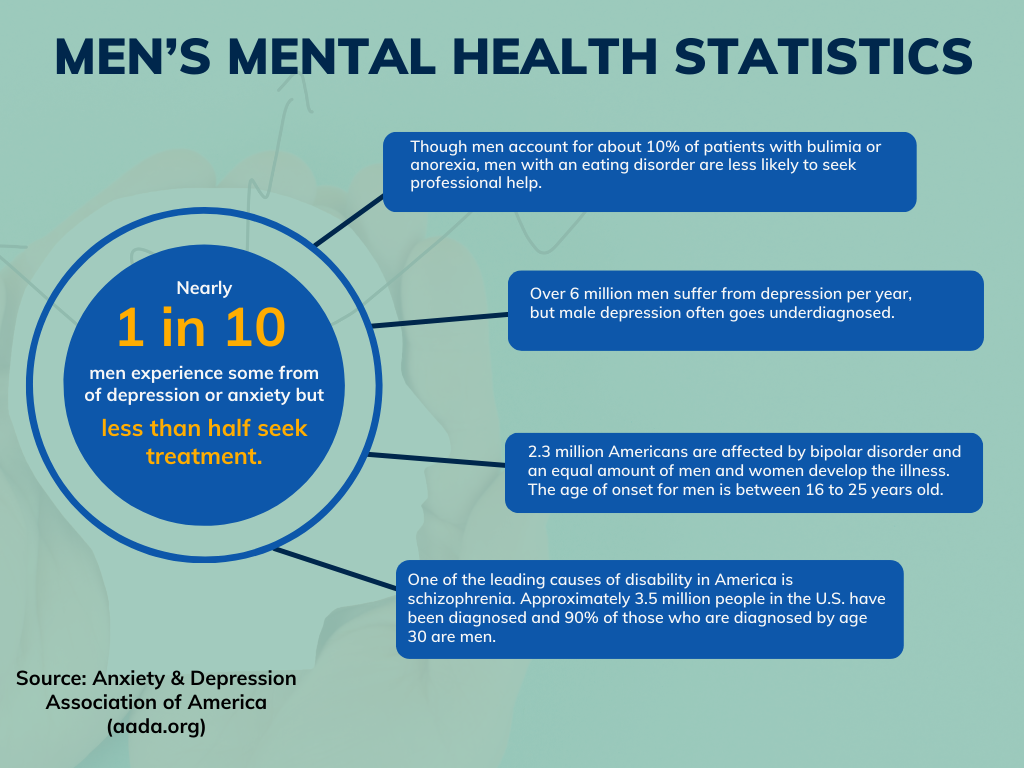A comprehensive exploration of men’s mental health, highlighting the societal stigmas and barriers that men face, the importance of awareness and support, and strategies for improving men’s mental well-being.
Overview of Men’s Mental Health
 Men’s mental health is a critical aspect of overall well-being that often goes unnoticed or unaddressed due to societal pressures and stigmas. Despite the prevalence of mental health issues among men, many continue to suffer in silence, leading to detrimental consequences such as higher rates of suicide. For example, research indicates that men are more likely to complete suicide, emphasizing the urgent need to prioritize men’s mental health care and destigmatize seeking help. By addressing men’s mental health through awareness, destigmatization, and support, we can create a healthier environment for individuals to seek the assistance they need.
Men’s mental health is a critical aspect of overall well-being that often goes unnoticed or unaddressed due to societal pressures and stigmas. Despite the prevalence of mental health issues among men, many continue to suffer in silence, leading to detrimental consequences such as higher rates of suicide. For example, research indicates that men are more likely to complete suicide, emphasizing the urgent need to prioritize men’s mental health care and destigmatize seeking help. By addressing men’s mental health through awareness, destigmatization, and support, we can create a healthier environment for individuals to seek the assistance they need.
When looking at the statistics on men’s mental health issues, it becomes evident that there is a significant gap in the diagnosis and treatment of mental health conditions among men. For instance, men with eating disorders, depression, panic disorder, phobias, bipolar disorder, and schizophrenia often go underdiagnosed, leading to untreated mental health issues. Additionally, the fact that less than half of men experiencing depression or anxiety seek professional help underscores the importance of raising awareness and promoting help-seeking behaviors. By acknowledging these statistics and addressing the barriers that prevent men from seeking mental health support, we can work towards a more inclusive and supportive approach to men’s mental well-being.
Statistics on Men’s Mental Health
The statistics on men’s mental health shed light on the urgency of addressing the unique challenges faced by men in seeking help and support. For example, men are more likely to complete suicide, with factors such as impulsivity and chosen methods contributing to higher rates of suicide among males. This stark reality emphasizes the critical need for interventions that target men’s mental health issues and provide accessible resources for those in need. Moreover, the underdiagnosis of conditions like depression and anxiety among men highlights the importance of early detection and intervention to prevent further escalation of mental health concerns.
In addition to the challenges presented by societal stigmas, men’s mental health issues are further exacerbated by the underreporting and underdiagnosis of various conditions. Men may struggle to recognize or acknowledge their mental health struggles due to cultural expectations and norms that discourage emotional expression. This reluctance to seek help can have severe consequences, as men are less likely to receive formal mental health support compared to women. By understanding the statistics on men’s mental health issues and the barriers that prevent men from accessing care, we can tailor interventions and support systems to better meet the needs of men facing mental health challenges.
Men’s mental health statistics underscore the importance of creating a more inclusive and understanding environment where men feel comfortable seeking help and support for their well-being. For instance, the fact that nearly one in ten men experience depression or anxiety highlights the prevalence of mental health issues among men. However, the low rate of treatment-seeking behavior among men indicates a gap in mental health care accessibility and acceptance. By addressing these statistics and working towards destigmatizing men’s mental health, we can promote a culture of openness and support that encourages men to prioritize their mental well-being without shame or judgment.
Societal Stigmas and Men’s Mental Health
The impact of societal stigmas on men’s mental health is profound, shaping individuals’ perceptions of seeking help and support. For example, the expectation for men to adhere to traditional gender roles can prevent them from acknowledging their vulnerabilities and seeking professional assistance for mental health concerns. These societal pressures often lead men to internalize their emotions, resulting in a reluctance to express their struggles or seek help when needed. As a result, men may exhibit different symptoms of mental health disorders than women, potentially leading to misdiagnosis or underdiagnosis of conditions like depression or anxiety. By addressing these stigmas and promoting a more inclusive and understanding approach to men’s mental health, we can create a safer space for men to seek help and support without fear of judgment or weakness.
Toxic masculinity norms further exacerbate the challenges faced by men in addressing their mental health concerns. These norms dictate that men should be strong, stoic, and self-reliant, often discouraging emotional expression or vulnerability. As a result, men may struggle to seek help for mental health issues, fearing that doing so would undermine their masculinity or competence. This perpetuates a cycle of silence and stigma around men’s mental health, preventing individuals from accessing the care they need to maintain their well-being. By challenging these toxic norms and promoting positive masculinity that embraces emotional openness and help-seeking behavior, we can create a more supportive environment for men to prioritize their mental health without shame or hesitation.
The societal stigmas surrounding men’s mental health can create barriers to seeking help and support, impacting individuals’ willingness to address their well-being. Men may face judgment or ridicule for expressing vulnerability or seeking assistance, leading to feelings of shame or inadequacy. This stigma can deter men from acknowledging their mental health struggles and seeking professional help, resulting in untreated conditions and escalating challenges. By breaking down these stigmas and promoting open conversations about men’s mental health, we can create a culture that values emotional expression and support, encouraging men to prioritize their mental well-being without fear of judgment or stigma.
The Importance of Men’s Mental Health Awareness
Raising awareness about men’s mental health is crucial in destigmatizing help-seeking behaviors and promoting a culture of support and understanding. For example, increasing public knowledge about the prevalence of mental health issues in men can encourage early intervention and treatment. By educating individuals about the signs and symptoms of common mental health disorders, we can empower men to recognize their struggles and seek appropriate support. Men’s mental health awareness campaigns aim to promote open conversations and reduce the stigma associated with seeking help, creating a more inclusive environment for men to address their well-being.
Incorporating mental health education in schools and workplaces is essential for promoting awareness and understanding of men’s mental health issues. For instance, integrating mental health curriculum into educational programs can help young men develop emotional intelligence and coping strategies for managing stress and anxiety. Similarly, implementing mental health initiatives in the workplace can create a supportive environment where men feel comfortable discussing their well-being and seeking assistance when needed. By normalizing conversations about men’s mental health and providing resources for support, we can empower individuals to prioritize their emotional well-being and seek help without shame or judgment.
Promoting men’s mental health awareness is crucial for reducing the stigma surrounding help-seeking behaviors and fostering a supportive environment for individuals to address their well-being. For example, by sharing personal stories of overcoming mental health challenges, men can inspire others to seek help and support, breaking down barriers to accessing care. Additionally, educating the public about the unique manifestations of mental health issues in men can lead to better identification and treatment of conditions like depression and anxiety. By encouraging open conversations and normalizing help-seeking behaviors, we can create a culture that values and supports men’s mental health, leading to healthier and happier communities.
Destigmatizing Men’s Mental Health
Destigmatizing men’s mental health is a critical step in encouraging individuals to seek help and support for their emotional well-being. For example, challenging stereotypes and promoting positive masculinity norms can help men feel more comfortable expressing their emotions and seeking assistance when needed. By debunking the myth that seeking help is a sign of weakness, we can empower men to prioritize their mental health without fear of judgment or shame. Moreover, creating a supportive environment that normalizes discussions around men’s mental health can lead to increased awareness and acceptance of help-seeking behaviors.
Breaking down the stigma surrounding men’s mental health requires a concerted effort to address the societal pressures and expectations that hinder individuals from seeking help. For instance, men are less likely to receive mental health treatment due to stigma and pressure to conform to traditional gender roles, leading to untreated mental health issues. By challenging these rigid gender expectations and promoting emotional expression as a healthy behavior, we can create a more inclusive and understanding environment for men to prioritize their well-being. Additionally, by advocating for policies that prioritize men’s mental health services, we can ensure that individuals have access to the support they need to address their mental health concerns.
Societal stigmas and toxic masculinity norms can hinder men from seeking help for mental health issues, perpetuating the stigma surrounding men’s mental well-being. These norms dictate that men should be strong, self-reliant, and emotionally reserved, often discouraging expressions of vulnerability or seeking assistance. As a result, men may internalize their struggles and avoid reaching out for support, leading to untreated mental health issues and escalating challenges. By addressing these stigmas and promoting a culture that values emotional openness and help-seeking behavior, we can create a safer space for men to prioritize their mental health without fear of judgment or shame. Ultimately, by destigmatizing men’s mental health and encouraging open conversations, we can foster a supportive environment that empowers men to seek the assistance they need to thrive emotionally and mentally.
Strategies for Improving Men’s Mental Health
Engaging men in physical activities and promoting healthy lifestyle choices can positively impact their mental well-being. For instance, regular exercise has been linked to reduced stress, anxiety, and symptoms of depression, offering men a natural and effective way to manage their emotional health. Additionally, physical activities like team sports or outdoor adventures can provide opportunities for social connection and stress relief, contributing to improved mental well-being. By encouraging men to prioritize their physical health, we can support their emotional well-being and overall quality of life.
Providing male-friendly mental health services that address the unique needs and preferences of men is essential in increasing accessibility to support. For example, creating support groups or therapy options tailored to topics like relationship issues, communication skills, or stress management can resonate more with men and encourage them to seek help. By offering services that align with men’s comfort levels and interests, we can reduce the barriers to seeking support and promote a culture of emotional openness and well-being. Moreover, incorporating mental health education in schools and workplaces can help raise awareness and promote early intervention, ensuring that men have the resources they need to prioritize their mental health.
Incorporating mental health education in schools and workplaces can help raise awareness about men’s mental health and promote early intervention. For example, integrating mental health curriculum into educational programs can equip young men with the knowledge and skills to manage stress, anxiety, and emotional challenges effectively. Similarly, implementing mental health initiatives in the workplace can create a supportive environment where men feel comfortable discussing their well-being and seeking assistance when needed. By normalizing conversations about men’s mental health and providing resources for support, we can empower individuals to prioritize their emotional well-being and seek help without shame or judgment. Ultimately, by promoting a culture of empathy and understanding, we can create a more inclusive and supportive environment for men to address their mental health concerns.
Importance of Men’s Mental Health Support
Building a network of support that includes friends, family, and mental health professionals is essential for men’s mental well-being. For example, having open conversations with friends and loved ones about mental health can provide individuals with emotional support and understanding during challenging times. Additionally, involving family members in discussions about mental health can foster empathy and create a safe space for men to express their emotions without fear of judgment. By establishing a strong support system, men can access the resources and guidance they need to navigate their mental health challenges effectively and proactively.
Offering tailored support groups and therapy options that cater to men’s specific mental health needs can significantly improve outcomes. For instance, providing therapy sessions or support groups focused on topics like stress management, anger management, or relationship skills can resonate more with men and encourage them to seek assistance. By tailoring mental health services to men’s preferences and concerns, individuals can receive targeted support that addresses their unique challenges and promotes emotional well-being. Advocating for policies that prioritize men’s mental health services and resources is crucial for creating a supportive environment that encourages help-seeking behavior and fosters a culture of well-being.
Advocating for policies that prioritize men’s mental health services and resources is crucial for creating a supportive environment that encourages help-seeking behavior and fosters a culture of well-being. For instance, by promoting initiatives that raise awareness about men’s mental health issues and reduce stigma, policymakers can ensure that accessible and effective resources are available to support men’s well-being. Additionally, advocating for funding for mental health programs tailored to men’s needs can lead to increased accessibility to care and support. By championing policies that prioritize men’s mental health and mental well-being, we can create a more supportive and understanding society that values emotional expression and prioritizes mental health care for all individuals.
Creating a supportive network that includes friends, family, and mental health professionals is essential for men to navigate their mental health challenges effectively. Establishing connections with individuals who can provide emotional support, guidance, and understanding can significantly impact men’s mental well-being and recovery. Moreover, offering tailored support groups and therapy options that cater to men’s specific mental health needs can enhance outcomes and promote emotional resilience. By advocating for policies that prioritize men’s mental health services and resources, we can create a culture that values and supports men’s emotional well-being, leading to healthier and more resilient communities.
Addressing Mental Health in the Workplace
Workplaces play a crucial role in supporting men’s mental health by creating environments that prioritize emotional well-being and support. For example, companies that offer mental health programs and initiatives can provide employees, including men, with resources to manage stress, anxiety, and other mental health challenges. By promoting a culture of openness and support, workplaces can encourage men to prioritize their mental well-being and seek assistance when needed. This proactive approach not only benefits individual employees but also contributes to a more positive and productive work environment overall.
Training managers and colleagues to recognize signs of mental health issues in male employees can facilitate early intervention and support. For instance, educating supervisors on how to have empathetic conversations with their male team members about mental health can break down barriers to seeking help. By creating a supportive and understanding workplace culture, men are more likely to feel comfortable discussing their mental health concerns and accessing the resources they need for support. Implementing mental health programs and initiatives in the workplace can promote a culture of well-being and support, ultimately leading to healthier and happier employees.
Implementing mental health programs and initiatives in the workplace can promote a culture of well-being and support that encourages men to prioritize their mental health. For example, offering employee assistance programs that provide confidential counseling services can be a valuable resource for men facing mental health challenges. These programs can create a safe space for men to discuss their issues and seek assistance without fear of judgment or stigma. By normalizing conversations about mental health and providing accessible resources, companies can support their male employees in prioritizing their emotional well-being and seeking the help they need. Ultimately, by fostering a culture of understanding and support, workplaces can create an environment where men feel valued, supported, and empowered to prioritize their mental health.
Role of Technology in Men’s Mental Health
Technology plays a vital role in supporting men’s mental health by providing accessible resources and platforms for seeking help. For instance, mental health apps that offer tools for mood tracking, mindfulness practices, and resource access can empower men to manage their mental well-being proactively and discreetly. Online counseling services provide a convenient and confidential space for men to seek professional support from licensed therapists, addressing their mental health concerns in a more private setting. By leveraging technology, men can access the resources they need to prioritize their mental well-being and seek assistance when needed.
Social media and online platforms serve as valuable tools for raising awareness about men’s mental health issues. Through targeted campaigns, educational content, and personal stories shared online, men can access information about mental health resources, coping strategies, and support networks. By leveraging the reach and connectivity of social media, organizations and individuals can contribute to reducing the stigma surrounding men’s mental health and fostering a more supportive and understanding community. Virtual mental health services, including teletherapy and online support groups, offer flexible options for men seeking help, ensuring that they have access to support when and where they need it. By utilizing technology to promote awareness and provide accessible resources, we can empower men to prioritize their mental health and well-being in a way that is convenient and effective.
The role of technology in men’s mental health is instrumental in providing convenient and accessible support for individuals seeking help. For example, mental health apps that offer features for tracking mood, practicing mindfulness, and accessing resources can empower men to manage their mental well-being proactively and discreetly. Online counseling services provide a platform for men to seek professional support from licensed therapists, addressing their mental health concerns in a confidential and convenient manner. By utilizing technology to offer mental health resources and support, men can access the assistance they need to navigate their emotional challenges and prioritize their well-being.
Final Thoughts
In conclusion, men’s mental health is a critical aspect of overall well-being that deserves greater attention and understanding in society. By addressing societal stigmas, promoting awareness, and providing support, we can create a culture that values and supports men’s mental health, leading to healthier and happier communities. It is essential to continue the dialogue on men’s mental health, advocate for better resources, and empower men to prioritize their well-being without shame or judgment. Together, we can create a society that values emotional openness, destigmatizes help-seeking behaviors, and supports men in their mental health journey.



0 Comments